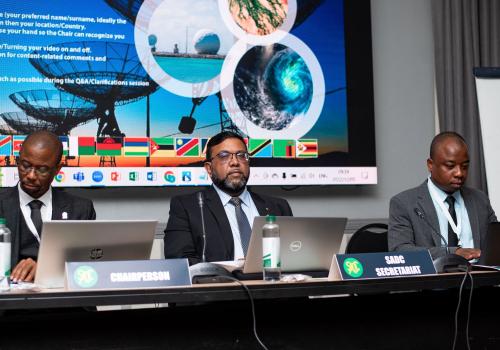The SADC Secretariat through its Climate Services Centre (SADC-CSC), is convening the mid-term review of the twenty-sixth Southern Africa Regional Climate Outlook Forum (SARCOF-26) from 5-7 December 2022 in Johannesburg, South Africa. The SARCOF-26 mid-term review is being supported through the European Union (EU) funded Intra-ACP Climate Services and related Application Programme (ClimSA). SADC- CSC is the specialised SADC regional climate institution whose mandate is to develop, generate and disseminate hydro-meteorological products, which make valuable contribution to the safety and well-being of the people and communities in the SADC region. These products also support key socioeconomic sectors including agriculture, energy, water resources, health, among others and are also crucial for increasing resilience and adaptation to climate variability and change in the region which is prone to hydrometeorology hazards such as flash floods, heatwaves, tropical cyclones and droughts.
Participants of the three day forum include climate prediction experts from the National Meteorological/Hydrological Services (NMHSs) in the SADC region, climate scientists from universities and research institutions, regional and international user's organisations and SADC Secretariat representatives from the water, energy, natural resources management.
SARCOF-26 is taking place under the theme “Early warning and early action: SADC region preparedness towards a ‘ready-set-go!’ approach”. Speaking on the theme of SARCOF 26, SADC Secretariat Director of Infrastructure, Mapolao Mokoena stated that “This readiness approach will enable regional agencies and other stakeholders to mobilise resources before the time of a potential impact comes and local actors on the other hand begin their initial preparations. Closer to the time of the climate impact, actions can then be taken directly and appropriately and greatly reduce the devastating socio-economic impact on the local community and facilitate the cost of recovery to the region.”
Discussions and reviews during the forum will give an overview of the changes which occurred with the main drivers during the initial phase of the rainfall season and with a view to improve the contribution of NMHSs to early warning and disaster preparedness. It will also inform for the better management of hydro-graphical basin and power dams. In his remarks, Dr Aderito Aramuge, the Permanent Representative of the World Meteorological Organisation (WMO) Mozambique stated that SARCOF dates back to the early 1990s and was initially part of the WMO Regional Climate Outlook Forum process which undertakes seasonal predictions of rainfall and temperature at regional scales to help national planning in key sectors such as agriculture, health, energy and water management. “It facilitates the regional cooperation and networking. Over the years, it demonstrated the benefits of sharing best practices and learning from experience within SADC countries.” He added.
Representing the host country, Mr Ishaam Abader Chief Executive Officer of the South African Weather Service and South Africa’s Permanent Representative to the WMO, stated that “We want SADC NMHSs better equipped to issue early warnings and disaster management and other agencies to be better prepared to take early action with a view to ensuring that the region is prepared for any climatological eventuality. Our training, knowledge, infrastructure and multilateral policy, among other things, empower us to see into the future so that we are better able to plan for the safety and well-being of our people and communities in the SADC region.”
The hybrid opening was attended physically by 78 delegates, will end on 7 December 2022, with a release of the SARCOF 26 MSR Official Statement and Early Warning Advisory Note.

